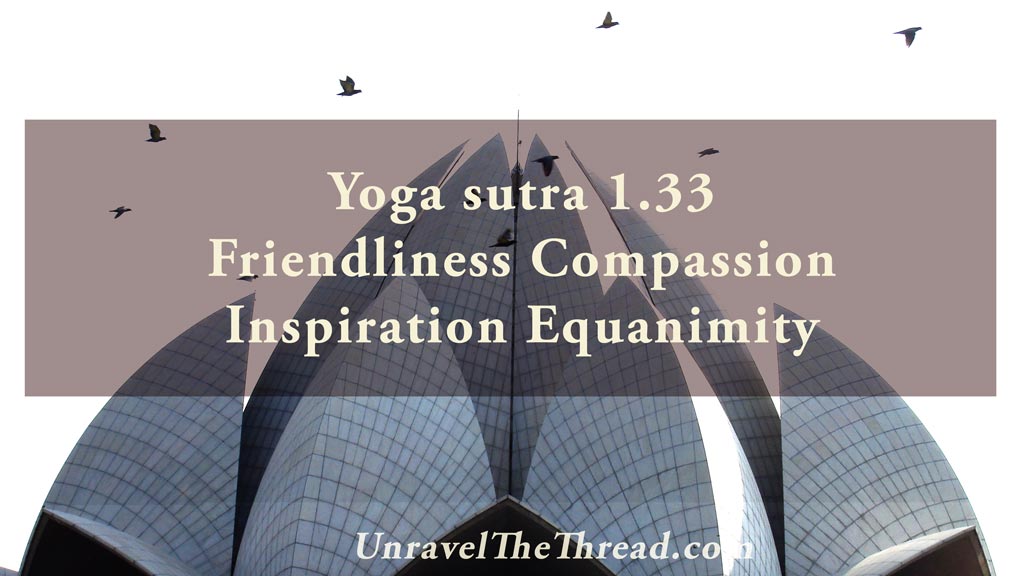
1.32 Single pointed focus
November 1, 2019
1.34 By exhalations and breath retentions
November 16, 2019
1.32 Single pointed focus
November 1, 2019
1.34 By exhalations and breath retentions
November 16, 20191.33 Friendliness, Compassion, Inspiration & Equanimity


1.33 Cultivating the habits of friendliness (maitri), compassion (karuna), inspiration (mudita) and equanimity (upeksha) purifies mind, body and heart.
This verse complements the previous one, harmonizing the effort and commitment required to maintain a single pointed focus with the habits that purify mind, body and heart. Since the firmness of unwavering single pointed focus may lead some practitioners towards rigidity, this verse also provides ways to moderate your attitude to yourself and to the world around you by helping you notice your biases to remove judgment. If the previous verse tried to engage your mind, this verse pertains to your emotions and your heart.
Biases and opinions act as filters that influence your internal environment and behavior. Your personal history and upbringing also contribute filters, while reinforcing other attitudes and inclinations. Whatever is happening around you also has an effect on your ways of being and attitudes. When you go anywhere, notice if an internal voice provides opinions and makes remarks about whatever you see, offering labels and judgments about anything that crosses your path. This sutra offers tools to clarify your internal environment, and to promote inner peace through balanced interactions with the world around you. In other words, this verse gives you options to turn your reactivity into responsibility, so that you can flow in harmony with life. Like with any other practice, the tools will probably expose areas where there is lack of clarity, or where there might be high reactivity. Without struggle or strain and with no self-judgment, use the tools with consistent single-pointed focus. Start by recognizing that your point of view is individual, presenting a single perspective; and that each person has her own individual perspective as well. When you reflect on your own life, you can see that your ideas, ways of thinking and behavior have changed over time, and that something you liked before may not be so important or interesting now. You have been fine-tuning your life experiment – in fact, you do it all the time – to adjust to your new levels of understanding and awareness. Sometimes you may even find that an idea that you now find powerful and exciting, escaped you completely before, because it was not on your radar or because you were not ready yet to assimilate it or apply it. Regardless of how much you adjust your ideas, chances are, that you keep adjusting them because you think and feel that this new configuration is the best you can do. Doing what you know at the time to be the best is the guiding principle for all those changes. That general rule is the same for each person.
As you grow and learn, you discover better ways of doing what you are doing – adjusting and transcending your previous and incomplete understanding. This is a sign that you are evolving. It is the same for each person. All of us are trying to find the best way of doing what we are doing to live a fulfilling life. And, like it has probably happened with every one of us, many times you find that what you thought was the best path of action actually wasn’t, because of some restriction or limitation in your ways of seeing or thinking precluding you from seeing with greater clarity. At those points rather than focusing on how wrong or misguided your actions were, you can choose to focus on a different and more beneficial way of being or doing. This verse guides you through that process so that you can have a moderate attitude toward yourself and others. This attitude is essential to avoid the internal and external toxicity that is generated by negative criticism, bitterness and anger directed to yourself or to others.
Consider these questions to guide your exploration: When other people are happy (sukha), can you identify with them and be happy for them (maitri), their successes and circumstances? When someone is suffering (duhkha), can you honestly wish for them to be free from pain and suffering (karuna)? Can you delight in and be inspired (mudita) by somebody else’s virtues and merits (punya)? As you notice actions, words or behavior that are unkind (apunya), can you pause and try to remove your biases by considering the situation with equanimity (upeksha) from different perspectives and afford that person the benefit of the doubt? As you see somebody doing something you disapprove of, can you remember that you are not perfect, that you have made mistakes before, and that probably you will make mistakes in the future? What are the conditions that you place on somebody else in order to accept them, forgive them, befriend them, assist them and love them? You can also reflect on this sentence: “Even though I may not understand their actions, every person around the world is trying to find peace, joy and love”
After reading these suggestions for exploration, you may get the feeling that you are supposed to let anybody do anything, even things you know to be unfair or harmful. However, consider what happens when somebody inadvertently steps on your toes. You probably find a way to remove your foot from under his foot, and you let the person know that they were doing something that was causing you discomfort or pain. In other words, you do what you need to do in order not to be harmed or in pain. How you choose to do that can be a conscious and life-affirming choice, or an unconscious and life-denying choice: it is completely up to you.
It may seem evident that cultivating these habits is working directly with your emotions. But you may ask, how does cultivating these habits purify your body and mind? You can test this out very easily. Do a simple series of movements that are familiar to you. Then, bring into your heart a memory of something that brings up mild feelings of disappointment, sadness, bitterness or regret. Notice the effects of these feelings within you. Keep those feelings and repeat the same series of familiar movements. Then pause the movements, close your eyes and feel. Did the movements feel different from the first time? Now, bring into your heart a memory of something or somebody that makes you feel uplifted, hopeful or cheerful. Notice how your internal environment changes. Try once again the same series of familiar movements. Pause, relax and close your eyes. Can your feelings affect what you are thinking, and how you move?
As usual, one more way of exploring the meaning of this sutra is by chanting it.
You can choose to chant it in its traditional form with some of the words coming together:
1.33 maitrī karuṇā muditopekṣāṇāṃsukhaduḥkha puṇyāpuṇyaviṣayāṇāṃ bhāvanātaḥ cittaprasādanam
मैत्री करुणा मुदितोपेक्षाणांसुखदुःख पुण्यापुण्यविषयाणां भावनातः चित्तप्रसादनम् ॥३३॥
Another option is to chant each word in the sutra individually:
- maitrī
- karuṇā
- mudita
- upekṣāṇāṃ
- sukha
- duḥkha
- puṇya
- apuṇya
- viṣayāṇāṃ
- bhāvanātaḥ
- citta
- prasādanam
Unravel the thread is now available as a book!
If you find Simple-Yoga.org and Unravel the thread useful, consider supporting my labor with a donation, you may also donate using PayPal or Venmo. Thank you!